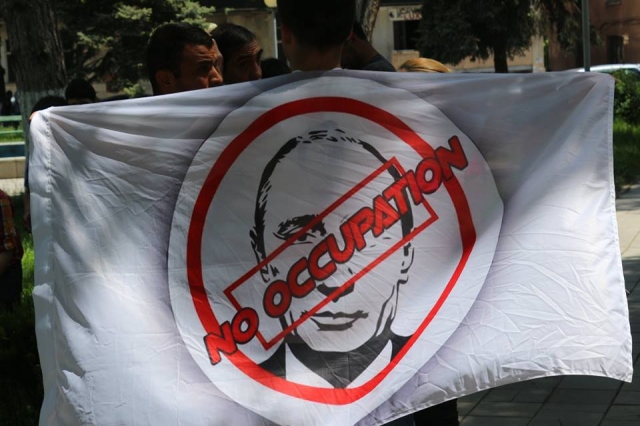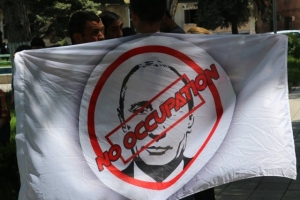Gori Marches for Georgia’s Dignity
On 19 May, a group of Georgian non-governmental organizations organized a counter-action in response to a rally held in Gori on May 9, calling on people to support Russia’s Eurasian Union.
The counter-action, entitled Gori for Georgia’s Dignity, involved thousands of civilians region-wide, centering around one idea:No to Russia’s Eurasian Union.
There have always been questions as to how the Soviet legacy has affected Gori, the town in which the dictator Joseph Stalin was born. Some people from previous generations believe that Gori should be a symbol of the Soviet Empire and the town should retain the Stalin museum and re-erect the statue which was removed by Saakashvili’s government after the war in August 2008.
However, younger generations who are mostly Western-oriented perceive Stalin as contrary to Georgia’s independence and statehood and do not celebrate this inheritance, which ultimately resulted in the occupation of two regions of Georgia by Russian troops.
It has been reported that some Russian-backed individuals, including the representatives of the Russia’s Fifth Column in Georgia, led the demonstration on May 9 in Gori supporting the Eurasian Union. Allegedly, Russian groups, who were not allowed to visit a Soviet soldier in Tbilisi’s Vake Park the same day, organized the event.
Information spread through social media said some marginal groups participated in the demonstration which many deemed to be against Georgia’s sovereignty and territorial integrity. Moreover, video montages and photos were shown portraying protesters as unaware of the purpose of the Gori action in which they were involved.
Meanwhile, weeks later, the very message of the counteraction was that Gori was no longer attached to the Soviet empire. “We came here to protect our country’s future and to show the entire world that Gori, and generally Georgia, has a progressive and future-oriented generation,” one of the participants told Georgia Today.
The protesters who strongly believe in Georgia’s European and Euro-Atlantic future condemned the aspirations of Russia, the occupying regime of Abkhazia and Tskhinvali region, making up 20 percent of Georgia’s sovereign territory.
In conclusion, some Georgian citizens look at the ongoing processes in the country quite skeptically as much of the country’s population remains vulnerable and lives in hardship.
Georgia is on the arduous road of political, economic and social transition from the Soviet to democratic value systems. Moreover, global developments and rapid technological and educational developments have forced the country to follow the quick tempo of more advanced European countries while Georgia remains unindustrialized and a technologically developing state in the region. Education, democracy and economic growth remain the unalterable remedies with which Georgians can address the remnants of its Soviet past.
Zviad Adzinbaia












